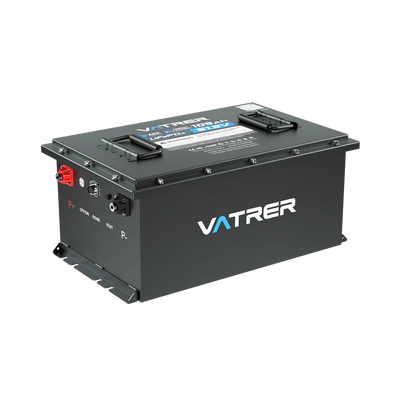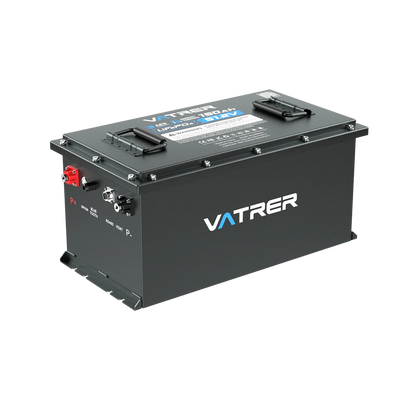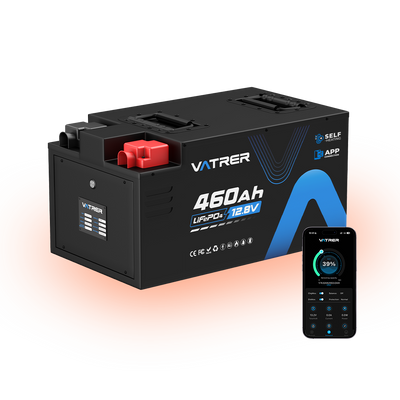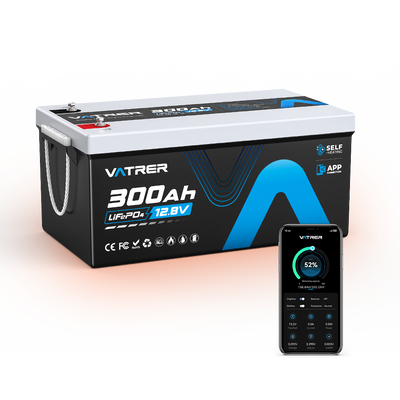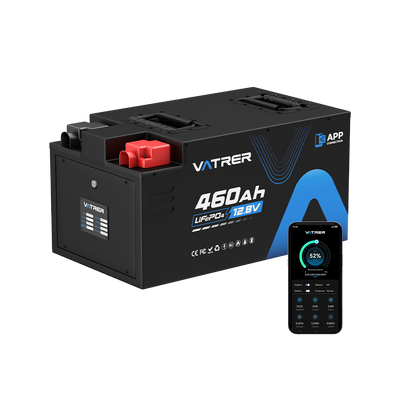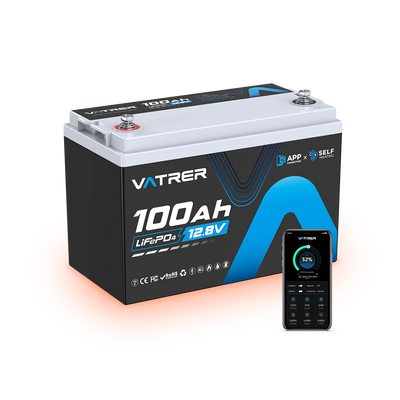How Much Does It Cost To Replace Golf Cart Batteries
Reading time 11 minutes
Golf carts are essential for cruising the fairways, navigating neighborhoods, or exploring gated communities, but their performance hinges on a reliable battery pack.
When it's time for a golf cart battery replacement, understanding the cost to replace golf cart batteries is key to making an informed decision. Whether you're upgrading a Club Car, EZGO, or Yamaha golf cart, costs can range from $400 to $4,000, depending on battery type, voltage, and installation needs.
This guide breaks down golf cart battery costs, compares types of golf cart batteries like lead-acid, AGM, and lithium golf cart batteries, and offers tips to maximize your investment.

What Are the Costs of Golf Cart Battery Replacement Options?
Choosing golf cart replacement batteries is like picking the right engine for your cart, it drives performance, range, and cost. The cost to replace depends on the battery type, each suits different budgets and usage patterns. Below is a breakdown of costs and key features for models like Club Car golf cart battery replacement or EZGO golf cart battery replacement.
| Battery Type | Price Per Battery | Number of Batteries Needed | Estimated Total Cost | Lifespan | Maintenance Needs |
|---|---|---|---|---|---|
| Flooded Lead-Acid | $100-$200 | 4-8 | $400-$1600 | 3-5 years | High (watering, cleaning) |
| AGM | $200-$350 | 4-8 | $800-$1400 | 4-6 years | Low |
| Lithium-Ion (LiFePO4) | $1,500-$4,000 | 1 | $2,000-$4,000 | 8-10 years | None |
- Flooded Lead-Acid Batteries: The budget option, ideal for infrequent users or older carts like Yamaha gas golf cart battery replacement. At $100-$200 per battery, a 48 volt golf cart battery replacement (4-8 batteries) costs $400-$1,600. Their 3-5 year lifespan and need for regular watering and terminal cleaning make them like an old car, cheap upfront but demanding over time.
- AGM Batteries: A middle ground, AGM batteries cost $200-$350 each, totaling $800-$2,800 for a set. With a 4-6 year lifespan and minimal upkeep (sealed design prevents spills), they're like a hybrid vehicle, better efficiency but not the top performer.
- Lithium-Ion (LiFePO4) Batteries: Priced at $1,500-$4,000 per battery. Their 8-10 year lifespan and zero maintenance make them like an electric car, higher initial cost but long-term savings. For example, Vatrer 48V golf cart lithium battery priced at approximately $1,500-2,500, provides over 4,000 cycles, enough to last you through multiple rounds of 18-36 holes.
- Installation Costs: In addition to battery prices, installation fees play a key role in total replacement costs. Professional installation ensures proper wiring, voltage balance, and safety checks. Labor costs usually range between $75-$500, depending on complexity and location. Simple lead-acid replacements average $75-$150, while lithium conversions that require controller or charger adjustments may reach $300-$500. DIY installation can reduce costs, but improper wiring or configuration may void warranties or reduce performance.
These costs set the stage for your battery replacement budget, but other expenses can add up. Let's explore those next.
Hidden Costs of Golf Cart Battery Replacement You Need to Know
Beyond the batteries themselves, additional expenses can impact your golf cart battery costs. Planning for these ensures your battery replacement budget is accurate, whether upgrading a Club Car or retrofitting an EZGO.
- Installation: Professional installation, recommended for safety and compatibility, costs $75-$500. Urban areas like Los Angeles may charge $200-$500, while rural regions average $75-$200. For lead acid to lithium upgrades, complex wiring for higher voltages can push costs higher.
- Charger Compatibility: Switching to lithium golf cart batteries requires a lithium-specific charger ($100-$600). a 58.4V 18A charger for 48 volt golf cart battery replacement ensures safe, fast charging in 5-6 hours. Therefore, to reduce your replacement costs, Vatrer offers 36V, 48V and 72V golf cart kits, all equipped with compatible dedicated chargers.
- Accessories: Lead-acid setups need watering systems ($50-$100) or voltage meters ($50-$200). Lithium-ion batteries, like Vatrer's, often include Bluetooth monitoring, reducing accessory costs.
- Disposal Fees: Recycling lead-acid batteries may cost $10-$30 per battery.
- Retrofit Costs: Upgrading to lithium-ion for older carts, such EZGO golf cart battery replacement from 36V to 48V, may require controller or wiring upgrades ($200-$600).
These hidden costs can affect your budget, but choosing the right battery type can minimize long-term expenses.
Which Golf Cart Battery Type Suits Your Replacement Needs?
Choosing the right battery type for golf cart battery replacement is like picking the perfect golf club, each has strengths for specific scenarios. Below is a detailed comparison of golf cart battery replacements for mainstream brands like Yamaha or Club Car models, answering your confusion about which battery is best for your golf cart.
| Feature | Lead-Acid | AGM | Lithium-Ion (LiFePO4) |
|---|---|---|---|
| Upfront Cost | Low ($100-$1,600) | Moderate ($800-$2,800) | High ($1,500-$4,000) |
| Lifespan | 3-5 years | 4-6 years | 8-10 years |
| Maintenance | High (watering, cleaning) | Low (sealed design) | None |
| Charging Time | 6-8 hours | 4-6 hours | 1-3 hours |
| Weight | Heavy (150-200 lbs) | Moderate (120-160 lbs) | Light (60-100 lbs) |
| Environmental Impact | High (toxic, less recyclable) | Moderate | Highly recyclable, environmentally friendly |
- Lead-Acid: Best suited for users with a limited budget and occasional weekend use. Their low upfront cost suits older Yamaha gas golf cart battery replacement, but frequent maintenance and short lifespan limit long-term value.
- AGM: Ideal for moderate users seeking less upkeep. Their sealed design prevents spills, making them safer for EZGO golf cart battery replacement, but their lifespan falls short of lithium-ion.
- Lithium-Ion: Perfect for frequent users or modern carts like club car. Their efficiency, lightweight design, and eco-friendliness make them ideal for 48 volt golf cart battery replacement, especially on hilly terrains.
Why Lithium Golf Cart Batteries Transform Your Battery Replacement Experience
Lithium golf cart batteries are like upgrading from a flip phone to a smartphone, more power, less hassle, and a better experience.
If you're considering replacing your golf cart battery, lithium-ion batteries offer superior performance and are ideal for frequent golf cart users like Club Car, EZGO, or Icon. Here's why they're a great value:
- Longevity: With 4,000-5,000 cycles, LiFePO4 batteries last 8-10 years. This reduces replacement frequency and long-term costs.
- Efficiency: Offering 100-200 Ah, they extend range by 15-25 miles per charge. Their 50% lighter weight boosts speed and handling, ideal for hilly courses.
- Zero Maintenance: No watering or cleaning is required, making it the best choice for professional golfers. By using the Vatrer 48V 105Ah battery equipped with Bluetooth monitoring, you can also monitor the charging and voltage status in real time.
- Safety: Built-in Battery Management Systems (BMS) prevent overcharging, short circuits, and thermal runaway. LiFePO4's stable chemistry ensures safety even in hot climates, unlike other lithium types.
- Eco-Friendly: 95% recyclable, LiFePO4 batteries have lower toxicity than lead-acid batteries, which contain lead and sulfuric acid requiring specialized disposal EPA Battery Recycling Guidelines.
What Impact the Cost to Replace Golf Cart Batteries?
Several factors shape golf cart battery costs, like ingredients in a recipe, each adds to the final price. Understanding these helps you plan your battery replacement budget for Club Car, EZGO, or Yamaha carts.
- Battery Type: Lead-acid batteries are cheapest upfront but cost more over time due to replacements. Lithium golf cart batteries save long term despite a higher initial cost.
- Voltage and Capacity: Higher voltages (36V, 48V, 72V) and larger capacity (100-200 Ah) increase costs. A 72V lithium-ion system for an Icon golf cart battery replacement costs $2,000-$3,000, while lead-acid is $1,000-$2,000. For 48 volt golf cart battery replacement, four 12V lead-acid or one 48V lithium-ion battery piece, but confirm controller compatibility.
- Number of Batteries: Lead-acid and AGM require 4-8 batteries, while lithium-ion needs 1 piece, simplifying installation and reducing costs.
- Brand and Warranty: Reputable brands like Vatrer offer warranty service covering defects and performance, unlike lead-acid's 1-2 years.
- Regional Variations: Installation cost in urban Los Angeles is $200-500, while in rural areas, due to lower labor costs, the average installation cost is $75-200.
- Installation Complexity: Lead acid to lithium upgrades may require rewiring or controller adjustments ($200-$600), especially for older EZGO models converting from 36V to 48V.
- Battery Chemistry & Design: The internal design and chemistry also influence cost. Lead-acid batteries use dense lead plates and liquid electrolytes, making them cheaper but heavier and less efficient. Lithium-ion (LiFePO4) batteries use advanced cell structures and smart BMS protection, raising production costs but offering superior longevity, energy density, and safety.
- DIY vs. Professional Installation: DIY installation can save $100-$300, but professional installation ensures compliance with safety standards and avoids wiring errors that may shorten battery life or void the warranty. Professional setups are particularly advised for lithium upgrades due to voltage differences and charger calibration.
Here is an overview of the total cost of replacing a golf cart battery.
| Battery Type | Average Battery Cost | Labor/Installation Cost | Added Features | Estimated Total Cost |
|---|---|---|---|---|
| Flooded Lead-Acid | $400–$1,600 | $75–$150 | Watering & Maintenance Kit ($50–$100) | $500–$1,850 |
| AGM | $800–$2,800 | $100–$200 | Minimal Maintenance | $900–$3,000 |
| Lithium-Ion (LiFePO4) | $1,500–$4,000 | $200–$500 | BMS, Bluetooth, Charger Included | $1,800–$4,500 |
While lithium-ion batteries cost more upfront, their minimal maintenance, long lifespan, and built-in features often make them the most cost-effective choice in the long run.
How to Extend Your Golf Cart Battery Replacement Investment
Proper care stretches your golf cart replacement batteries lifespan, like regular tune-ups for a car. These tips maximize value for lead-acid, AGM, or lithium golf cart batteries:
- Charge Smartly: Charge the battery when it reaches 50% capacity to avoid deep discharge, which can damage all types of golf cart batteries. For lithium batteries, it is recommended to use a smart charger with an automatic power-off function to prevent overcharging.
- Lead-Acid Maintenance: Check water levels monthly with distilled water and clean terminals with baking soda and water to prevent corrosion. This is critical for Club Car golf cart battery replacement using lead-acid.
- Lithium-Ion Care: Use a compatible charger and monitor via Bluetooth apps for real-time stats like charge cycles and voltage. Avoid extreme temperatures (above 140°F or below -4°F) to preserve capacity.
- Storage: Store your cart in a cool, dry place to avoid temperature damage, heat accelerates degradation, especially for lead-acid batteries.
- Avoid Mixing Batteries: Many golf cart owners often wonder, "Can I use four 12V batteries in my 48V golf cart?" The answer is yes, provided they are brand new and identical. Mixing old and new batteries will cause imbalance, which can reduce performance. If one battery needs to be replaced, replace all batteries at the same time. However, this is not recommended due to the high risk involved.
- Limit Heavy Loads: Avoid overloading, such as carrying multiple passengers on steep slopes.
Conclusion
Armed with insights on golf cart battery replacement, you're ready to make an informed decision for your Club Car, EZGO, Yamaha, or Icon cart. Golf cart battery costs range from $400-$4,000, driven by battery type, number of batteries, and installation factors like higher voltages (36V, 48V, 72V) or retrofitting needs.
For most buyers seeking the best long-term value, a complete lithium battery conversion kit with professional installation and accessories typically costs between $2,000 and $3,500, including both parts and labor.
Visit Vatrer shop for a new-user discount and choose a battery replacement that ensures reliable, long-lasting performance for your golf cart adventures.
FAQs
Compatibility depends on your cart's voltage and controller system. For example, a Club Car or EZGO golf cart battery replacement typically uses a 48V system, which can support lithium-ion batteries.
However, older carts may require controller upgrades or wiring adjustments to handle lithium-ion's higher efficiency and discharge rates. Check your cart's manual for voltage specifications and consult a professional technician to assess controller compatibility.
Lithium-ion (LiFePO4) batteries are safe when handled correctly due to their built-in Battery Management Systems (BMS), which prevent overcharging and thermal runaway.
However, follow these precautions: Always use a lithium-specific charger to avoid voltage mismatches. During installation, ensure proper polarity and secure connections to prevent short circuits, ideally by a professional.
Store batteries in a cool, dry place (below 140°F) to avoid heat-related degradation. Unlike lead-acid batteries, LiFePO4 batteries don't emit hazardous gases, but avoid physical damage to the battery casing, which could compromise safety. Vatrer' batteries include low-temperature cutoff and short-circuit protection for added security.
Yes, lithium golf cart batteries perform well in extreme weather, but precautions are needed. LiFePO4 batteries operate effectively between -4°F and 140°F, unlike lead-acid batteries, which degrade rapidly in heat.
For cold climates, choose batteries with low-temperature cutoff, like Vatrer golf cart battery model, which stops charging below -4°F to prevent damage. In hot climates, avoid prolonged exposure to temperatures above 140°F by storing the cart in a shaded, ventilated area.
Monitor battery health via Bluetooth apps to detect temperature-related issues early. Regular checks and proper storage extend lifespan, ensuring your EZGO or Yamaha golf cart battery replacement thrives in harsh conditions.
If your golf cart replacement batteries underperform, first check compatibility and installation. For lithium golf cart batteries, ensure the charger matches the battery’s voltage and the BMS is functioning. For lead-acid batteries, verify water levels and terminal cleanliness, as neglect can cut performance. If issues persist, contact your battery supplier.
Replacing a set of 6 golf cart batteries typically applies to lead-acid or AGM configurations in higher-voltage systems, such as a 72V setup (using six 12V batteries). Costs vary by battery type:
- Flooded Lead-Acid: $600-$1,200 ($100-$200 per battery), plus $10-$30 per battery for disposal fees.
- AGM: $1,200-$2,100 ($200-$350 per battery), with minimal additional fees due to sealed design.
- These estimates exclude installation ($75-$500) and potential charger upgrades ($100-$600).
- Lithium-ion Battery: Asingle 72V battery replaces the need for 6, costing $2,500-$4,000 but offering longer life (8-10 years) and lower long-term expenses.
Always replace the entire set at once to avoid performance imbalances, and factor in your cart's voltage (like Club Car or EZGO models) for accurate quotes.















































































